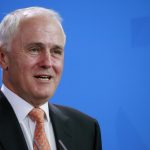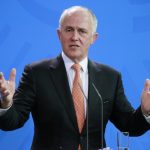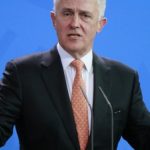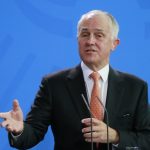Turnbull Plans for Australia to Become a Top Arms Dealer
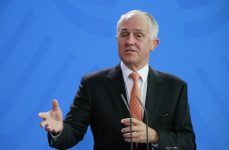
The Turnbull government announced last week that it’s decided to invest heavily in the misery of foreigners, while moving down the war economy path. The plan is to ramp up investment in arms exports, with the aim of Australia becoming one of the world’s top ten players in the industry.
And why not? The government has given up on other options. Under the Coalition’s watch, the Australian automotive industry has come to a grinding halt. And the prospect of investing in innovative industries, such as renewable energy and electric cars, has been completely ignored.
A consistent assault
And it seems in keeping with its recent track record that the government has chosen to focus upon another hostile endeavour.
Over the last twelve months, the federal government has set its sights on gagging charities, pulling the rug out from beneath welfare recipients, and cutting off the lifeline to asylum seekers it had already been holding prisoner offshore on a long-term basis.
These manoeuvres have all been carried out at the same time as Australia is set to take a seat on the UN Human Rights Council: the leading body of its kind in the world.
So, it’s fitting that Turnbull and his cronies are now investing in an industry that will invariably see some of the world’s poorest citizens become the casualties of the weapons local companies will be producing in the name of propping up job promises the Coalition made during the 2016 election.
The Defence Export Strategy
On January 29, the prime minister, along with defence industry minister Christopher Pyne and defence minister Marise Payne, held a press conference at the Rydalmere headquarters of Thales Australia: a leading defence contractor for the Australian defence force.
The trio announced the federal government’s new Defence Export Strategy, which by the year 2028 is to “achieve greater export success to build a stronger, more sustainable and more globally competitive Australian defence industry to support Australia’s defence capability needs.”
As part of the strategy, the new Australian Defence Export Office will be established in conjunction with Austrade and the Centre for Defence Industry Capability to “coordinate whole-of-government efforts” and to provide a focal point for increasing arms exports.
An Australian defence export advocate will also be appointed to deal with high-level promotions of Australian-made weapons internationally.
Large-scale investment in death
The government is set to develop a $3.8 billion Defence Export Facility administered by the Export Finance and Insurance Corporation: the nation’s export credit agency. This will ensure that Australian companies can secure the finances needed to underpin sales of equipment overseas.
And the government will also invest $20 million a year to implement the strategy. This will include $6.35 million to run multi-year export campaigns, and an additional $4.2 million for grants to help build small to medium enterprises overseas.
This long-term investment in arms exports all boils down to, as the prime minister puts it, “Australian jobs, 21st century jobs, high-tech, cutting-edge jobs.” And it seems this job growth is worth the lives that will be lost overseas, especially when they’ll go unreported, for the most part.
Priority markets
The Stockholm International Peace Research Institute (SIPRI) listed the top ten arms exporting countries between 2012 and 2016, as the United States, Russia, China, France, Germany, the UK, Spain, Italy, the Ukraine and Israel.
During that period, Australia came in as the 20th biggest exporter globally.
The top ten arms importers were India, Saudi Arabia, the United Arab Emirates, China, Algeria, Turkey, Australia, Iraq, Pakistan and Vietnam.
Currently, Australia is achieving $1.5 to $2.5 billion in “defence exports” each year. And the federal government wants these numbers to significantly increase.
Under the government’s new export strategy, the nations that, along with Australia, make up the Five Eyes communications data sharing alliance – the United States, the UK, Canada and New Zealand – have been prioritised as the top export markets for the defence industry.
And following those nations the strategy then lists countries within the Indo-Pacific region, the Middle East and Europe as a priority.
Supporting repression
One of the markets that Australia has already been focusing on in the Middle East is Saudi Arabia. However, the government prefers to keep the details of its deals with the Saudis to itself.
In 2016, the Australian government approved four export deals with Saudi Arabia, while last year, it approved another five. And over this time period, Saudi Arabia and its allies have been involved in a devastating conflict with Yemen.
The fighting, which is between the Saudis and Iran-aligned opposition Houthis rebels, began back in 2015.
As of last year, the UN reported that 7 million people in Yemen are on the brink of starvation as a result of the conflict and the country is close to famine. While 75 percent of the population is in need of humanitarian assistance.
On Australia’s doorstep
The Australian Department of Defence organises trade missions to go to international arms fairs via Team Defence Australia (TDA). And in 2016, TDA took 22 Australian Defence companies to the Indo Defence Expo and Forum in Jakarta.
The show’s brochure was endorsed by Indonesia’s defence minister Ryamizard Ryacudu, who played a key role in the brutal repression of self-determination movements in the regions of West Papua and Aceh.
Since Indonesia began its occupation of West Papua in 1963, an estimated 500,000 locals have lost their lives at the hands of the Indonesian military and police.
By November 2016, it was estimated that over 4,000 West Papuans had been arrested by Indonesian authorities for peacefully protesting throughout that year.
Benefiting from misery
Following the government’s announcement, Marc Purcell of the Australian Council for International Development said that Australia’s claim of being a champion of international peace and stability is being undermined by its decision to invest in greater arms exports.
While Tim Costello of World Vision Australia stated that “millions of people across the world are running from violence” and the Turnbull government’s answer is to produce and export more weapons. He further said that any money made from this “dirty business will be blood money.”
However, the Turnbull government is well aware that its planned investment in export arms is profiteering in lives of the some of the world’s disenfranchised and the poor. And the Coalition is aware of these brutalities when it refuses to release the details on the Saudi military export deals.
And as West Papuan independence leader Benny Wenda reminded Sydney Criminal Lawyers® last November, during the Second World War, the ancestors of the West Papuans “helped, fought and died alongside Australian soldiers to preserve Australia’s freedom.”
Lest we forget, they say. Yet, some of them up top, readily do so.


